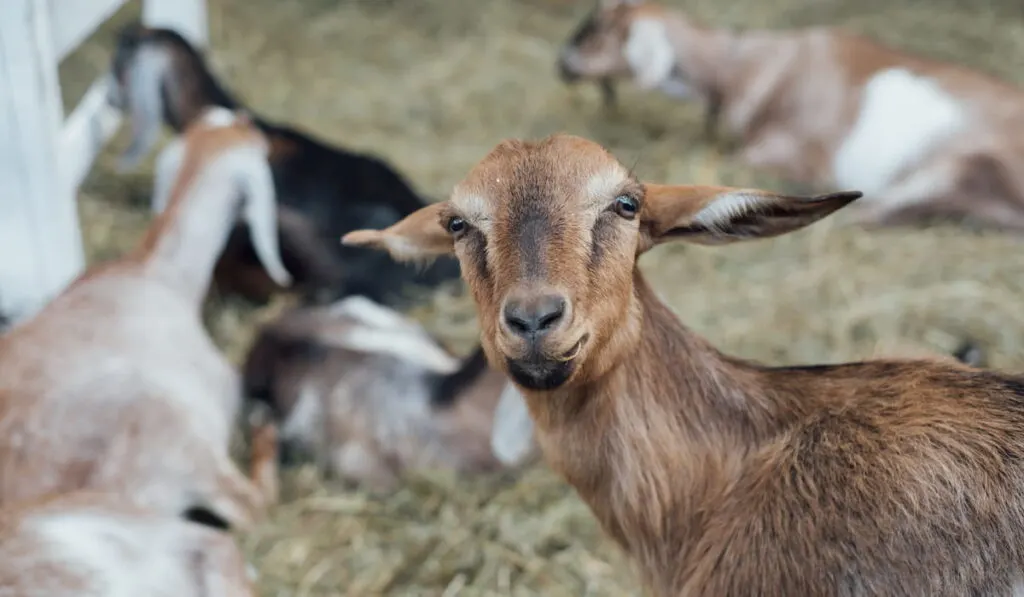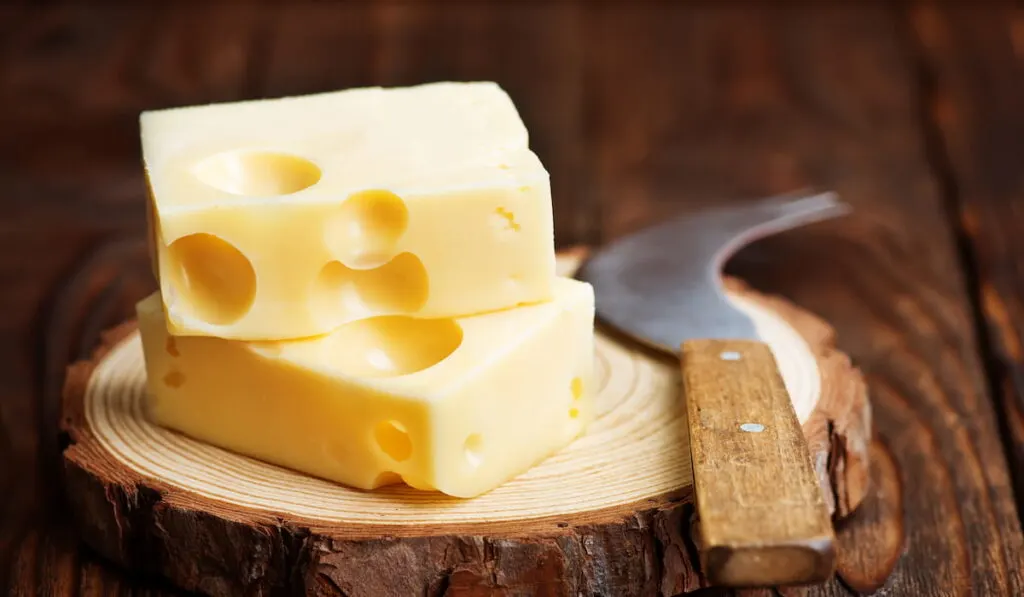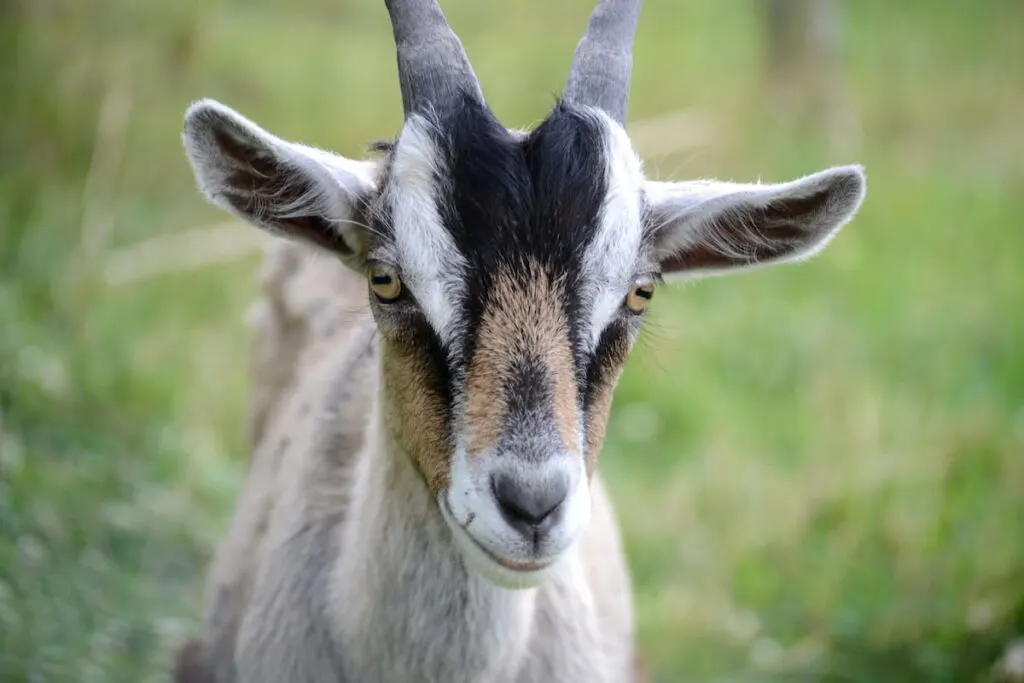Goats are smart enough to recognize food items they should not eat.
But this does not rule out the possibility of them nibbling at those things they should not eat.
Goats are herbivorous animals but do not be surprised if they try to eat cheese.
Can goats eat cheese? No, goats should not eat cheese.
Goats are ruminant animals, so their stomachs are designed to digest food items with a certain level of dietary fiber to maintain healthy function.

Cheese typically does not contain fiber so goats might not be able to digest it efficiently it could cause them to suffer issues with the digestive system.
You might be wondering what other food items your goat shouldn’t eat or if you could give your goat just a tiny amount of cheese.
Here are the answers to these questions and much more.
Can Goats Eat Cheese?
Like cattle and sheep, goats are herbivorous ruminant animals.
Most of their digestion is carried out by fermentative microbes in their guts.
The design of their stomach, particularly the rumen, is such that fiber is needed to start the fermentation pathway, which converts feed to energy.
This is why a goat’s regular diet typically consists of hay, grass, and similar fibrous foods.
In the absence of fiber, a goat’s rumen will not function properly.
Consequently, the goat will suffer digestive issues such as goat bloat.
Cheese is one of the many foods that typically contain little or no fiber. So, if given to goats regularly, it will cause digestive issues.
Besides the lack of dietary fiber, the most predominant nutrient in cheese is fat.
According to the USDA, cheddar cheese contains about 33% of total fat and about 21% of saturated fat (source).
Of all types of fat, saturated fat has the lowest digestibility in ruminant animals. So, the fat in cheese may also worsen digestion in goats.
Dangers of Eating Cheese in Goats
As said earlier, eating cheese will cause digestive issues in goats.
For one, cheese does not contain fiber, a substance vital to the functions of the rumen.
Secondly, cheese contains high levels of saturated fat.
Since saturated fats are generally less digestible, this may also lead to digestive issues.
Also, cheese contains significant amounts of unsaturated fat. Unsaturated fats are digestible. However, they may affect the fermentation of fiber by rumen bacteria.
It is suggested that the more unsaturated a fatty acid is, the more likely it is to be toxic to bacteria in the rumen.
Of course, if the bacteria in the rumen are reduced or lost, fiber digestion will reduce.
Besides that, the efficiency of digestion will fall, and the function of the rumen will be affected.

The fat in cheese may be rumen-active. Rumen-active fats coat fiber particles in the rumen and block them from being digested.
Besides this, fatty acids can also bind some minerals like magnesium and calcium.
These two minerals play vital roles in the survival of bacteria and the function of the muscles of the rumen. But when fat binds them, they become unavailable and cannot fulfill their usual role.
Consequently, the efficiency of digestion may suffer.
Yet another danger is that there is a chance goats can get bovine spongiform encephalopathy from eating cheese.
It is advised that ruminants do not eat feed or food items made with ingredients from another ruminant. So, since cheese is typically gotten from the milk of ruminant animals, you should keep it away from your goats.
As a matter of fact, it is illegal to give feed made from some tissues of a ruminant to other ruminants.
The said tissues are called specified risk material, and they vary across jurisdictions.
Other Food Items Goats Should Not Eat
We all know how curious goats can get with food.
While they are sometimes discerning, you cannot always rely on them to avoid harmful food items.
So, to ensure their safety, keep such food items away from them.
If you are not sure of the food items goat cannot eat, check out the list below for some of them:
- Meat
- Dairy Products
- Avocado
- Kale and other plants with oxalates
- Cat Food
- Dog Food
- Chocolate
- Wild Cherries
- Milkweed
- Azaleas
- Rhubarb Leaves
- Any nightshade vegetable
- Lilacs
- Holly Bushes
- Lily of the Valley
The list above is not comprehensive. So, when you are not sure, you should ask a veterinarian or check reliable sources online.

Can I Give My Goat a Tiny Amount of Cheese?
You might give your goat a tiny amount of cheese without consequences the first time.
But in the long run, it may be harmful.
The risks that come with goats eating cheese far outweigh any benefit it offers. So, it is better not to let them have cheese at all.
In place of cheese, you can give your goats the following food items as treats:
- Apple
- Banana
- Lettuce
- Carrot
- Watermelon
- Celery
- Grapes
- Pumpkin
- Pears
Final Thoughts
The nutritional content of cheese is not suited for a goat’s digestive system.
So, if a goat eats cheese, there is a strong chance that it will have detrimental effects to the goat’s digestive system.
Resources
- https://animals.mom.com/what-should-goats-not-eat-7897004.html
- https://goats.extension.org/goat-nutrition-carbohydrates/
- https://ruminantdigestivesystem.com/rumen-environment/rumen-fermentation
- https://www.megalac.com/resources-advice/fats-advice/69-fat-digestibility-ruminants
- https://www.megalac.com/resources-advice/fats-advice/70-individual-fatty-acid-digestibility-ruminants
- https://www.megalac.com/resources-advice/fats-advice/60-rumenunprotected-rumenactive-fats
- https://www.megalac.com/resources-advice/fats-advice/60-rumenunprotected-rumenactive-fats
- https://rurallivingtoday.com/livestock/what-do-goats-eat/
- https://morningchores.com/feeding-goats/
- https://opensanctuary.org/article/daily-diet-treats-supplements-for-goats/
